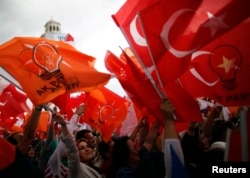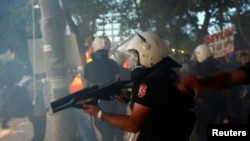ISTANBUL —
Turkish riot police stormed an Istanbul park at the heart of two weeks of protests against Prime Minister Tayyip Erdogan on Saturday, firing tear gas and water cannons and sending hundreds scurrying into surrounding streets.
Lines of police backed by armored vehicles sealed off Taksim Square in the center of the city as officers stormed the adjoining Gezi Park, where protesters had been living in a ramshackle tent camp.
Erdogan had warned hours earlier that security forces would clear the square, the center of more than two weeks of fierce anti-government protests that spread to cities across Turkey, unless the demonstrators withdrew before a ruling party rally in Istanbul on Sunday.
'We have our Istanbul rally tomorrow. I say it clearly: Taksim Square must be evacuated, otherwise this country's security forces know how to evacuate it," he told tens of thousands of flag-waving supporters at a rally in Ankara.
A main public-sector union confederation, KESK, which has some 240,000 members, said it would call a national strike for Monday, while a second union grouping said it was holding an emergency meeting to decide whether to join the action.
Panicked protesters fled into an upmarket hotel at the back of the park, several of them vomiting, as clouds of tear gas and blasts from what witnesses said were percussion bombs - designed to create confusion rather than injure - engulfed the park.
"We tried to flee and the police pursued us. It was like war," Claudia Roth, the co-chair of Germany's Greens party who had gone to Gezi Park to show her support, told Reuters.
Thousands of people spilled onto a main avenue leading to Taksim after the raid, ripping up street signs and starting to build barricades, while police fired tear gas into back streets around the square to try to prevent protesters regrouping.
Local television footage showed groups of demonstrators blocking a main highway to Ataturk airport on the western edge of the city, while to the east several hundred walked towards a main bridge crossing the Bosphorus waterway towards Taksim.
Wave of Unrest
"We will continue our work to constitute a peaceful environment in the next few hours," Istanbul Governor Huseyin Avni Mutlu told reporters, describing the police operation as "extremely smooth." He said 29 people had been lightly injured.
Protesters also gathered in Ankara around the central Kugulu Park, including opposition MPs who sat in the streets in an effort to prevent the police firing tear gas.
A similar police crackdown on peaceful campaigners in Gezi Park two weeks ago provoked an unprecedented wave of protest against Erdogan, drawing in secularists, nationalists, professionals, trade unionists and students who took to the streets in protest at what they see as his autocratic style.
The unrest, in which police fired tear gas and water cannon at stone-throwing protesters night after night in cities including Istanbul and Ankara, left four people dead and about 5,000 injured, according to the Turkish Medical Association.
The Gezi Park protesters, who oppose government plans to build a replica Ottoman-era barracks there, had defied repeated calls to leave but had started to reduce their presence in the park after meetings with Erdogan and the local authorities.
"This is unbelievable. They had already taken out political banners and were reducing to a symbolic presence in the park,'' Koray Caliskan, a political scientist at Bosphorus University, told Reuters from the edge of Gezi Park.
Several people were brought out of the park on stretchers to waiting ambulances, while families with young children fled into side streets from a main shopping street leading to the square.
Residents in surrounding neighborhoods took to their balconies or leaned out of windows banging pots and pans, their clatter rising above the wail of ambulance sirens, while car drivers sounded their horns in support of the protesters.
Erdogan told protesters on Thursday that he would put the building plans on hold until a court rules on them. It was a softer stance, after two weeks in which he called protesters "riff-raff" and said the plans would go ahead regardless.
Defiant Again
But at the first of two rallies this weekend by his ruling AK Party, he reverted to a defiant tone, telling tens of thousands of supporters on the outskirts of Ankara that he would crush his opponents at elections next year.
He called for unity among Turks and accused foreign forces, the main opposition Republican People's Party (CHP), international media and market speculators of stoking unrest and trying to undermine the economy.
The police intervention so soon after Erdogan had spoken took many by surprise on a busy Saturday night around Taksim, one of Istanbul's main social hubs, not least after President Abdullah Gul, who has struck a more conciliatory tone than Erdogan, said earlier on Saturday that talks were progressing.
"The fact that negotiation and dialogue channels are open is a sign of democratic maturity ... I believe this process will have good results," Gul had said on his Twitter account.
What began as a campaign by environmentalists to save one of central Istanbul's few green spaces spiralled into the most serious show of defiance against Erdogan and his AK Party of his decade in power.
Erdogan has long been Turkey's most popular politician, his AK Party winning three successive election victories, each time with a larger share of the vote, but his critics complain of increasing authoritarianism.
He has said the AK Party rallies in Ankara and Istanbul are meant to kick off campaigning for local elections next year and not related to the protests, but they are widely seen as a show of strength in the face of the demonstrations.
"At the beginning I felt sympathy towards those in Gezi Park and I thought our prime minister's tone was too harsh. But now the protests there have turned into something else,'' said Sumeyye Erdogmus, a 22-year-old nurse, at the Ankara rally. "Nothing can justify behavior like cursing the prime minister's mother and burning buses. This is anarchy, and today we are here to show that our prime minister is not alone."
Lines of police backed by armored vehicles sealed off Taksim Square in the center of the city as officers stormed the adjoining Gezi Park, where protesters had been living in a ramshackle tent camp.
Erdogan had warned hours earlier that security forces would clear the square, the center of more than two weeks of fierce anti-government protests that spread to cities across Turkey, unless the demonstrators withdrew before a ruling party rally in Istanbul on Sunday.
'We have our Istanbul rally tomorrow. I say it clearly: Taksim Square must be evacuated, otherwise this country's security forces know how to evacuate it," he told tens of thousands of flag-waving supporters at a rally in Ankara.
A main public-sector union confederation, KESK, which has some 240,000 members, said it would call a national strike for Monday, while a second union grouping said it was holding an emergency meeting to decide whether to join the action.
Panicked protesters fled into an upmarket hotel at the back of the park, several of them vomiting, as clouds of tear gas and blasts from what witnesses said were percussion bombs - designed to create confusion rather than injure - engulfed the park.
"We tried to flee and the police pursued us. It was like war," Claudia Roth, the co-chair of Germany's Greens party who had gone to Gezi Park to show her support, told Reuters.
Thousands of people spilled onto a main avenue leading to Taksim after the raid, ripping up street signs and starting to build barricades, while police fired tear gas into back streets around the square to try to prevent protesters regrouping.
Local television footage showed groups of demonstrators blocking a main highway to Ataturk airport on the western edge of the city, while to the east several hundred walked towards a main bridge crossing the Bosphorus waterway towards Taksim.
Wave of Unrest
"We will continue our work to constitute a peaceful environment in the next few hours," Istanbul Governor Huseyin Avni Mutlu told reporters, describing the police operation as "extremely smooth." He said 29 people had been lightly injured.
Protesters also gathered in Ankara around the central Kugulu Park, including opposition MPs who sat in the streets in an effort to prevent the police firing tear gas.
A similar police crackdown on peaceful campaigners in Gezi Park two weeks ago provoked an unprecedented wave of protest against Erdogan, drawing in secularists, nationalists, professionals, trade unionists and students who took to the streets in protest at what they see as his autocratic style.
The unrest, in which police fired tear gas and water cannon at stone-throwing protesters night after night in cities including Istanbul and Ankara, left four people dead and about 5,000 injured, according to the Turkish Medical Association.
The Gezi Park protesters, who oppose government plans to build a replica Ottoman-era barracks there, had defied repeated calls to leave but had started to reduce their presence in the park after meetings with Erdogan and the local authorities.
"This is unbelievable. They had already taken out political banners and were reducing to a symbolic presence in the park,'' Koray Caliskan, a political scientist at Bosphorus University, told Reuters from the edge of Gezi Park.
Several people were brought out of the park on stretchers to waiting ambulances, while families with young children fled into side streets from a main shopping street leading to the square.
Residents in surrounding neighborhoods took to their balconies or leaned out of windows banging pots and pans, their clatter rising above the wail of ambulance sirens, while car drivers sounded their horns in support of the protesters.
Erdogan told protesters on Thursday that he would put the building plans on hold until a court rules on them. It was a softer stance, after two weeks in which he called protesters "riff-raff" and said the plans would go ahead regardless.
Defiant Again
But at the first of two rallies this weekend by his ruling AK Party, he reverted to a defiant tone, telling tens of thousands of supporters on the outskirts of Ankara that he would crush his opponents at elections next year.
He called for unity among Turks and accused foreign forces, the main opposition Republican People's Party (CHP), international media and market speculators of stoking unrest and trying to undermine the economy.
The police intervention so soon after Erdogan had spoken took many by surprise on a busy Saturday night around Taksim, one of Istanbul's main social hubs, not least after President Abdullah Gul, who has struck a more conciliatory tone than Erdogan, said earlier on Saturday that talks were progressing.
"The fact that negotiation and dialogue channels are open is a sign of democratic maturity ... I believe this process will have good results," Gul had said on his Twitter account.
What began as a campaign by environmentalists to save one of central Istanbul's few green spaces spiralled into the most serious show of defiance against Erdogan and his AK Party of his decade in power.
Erdogan has long been Turkey's most popular politician, his AK Party winning three successive election victories, each time with a larger share of the vote, but his critics complain of increasing authoritarianism.
He has said the AK Party rallies in Ankara and Istanbul are meant to kick off campaigning for local elections next year and not related to the protests, but they are widely seen as a show of strength in the face of the demonstrations.
"At the beginning I felt sympathy towards those in Gezi Park and I thought our prime minister's tone was too harsh. But now the protests there have turned into something else,'' said Sumeyye Erdogmus, a 22-year-old nurse, at the Ankara rally. "Nothing can justify behavior like cursing the prime minister's mother and burning buses. This is anarchy, and today we are here to show that our prime minister is not alone."
















